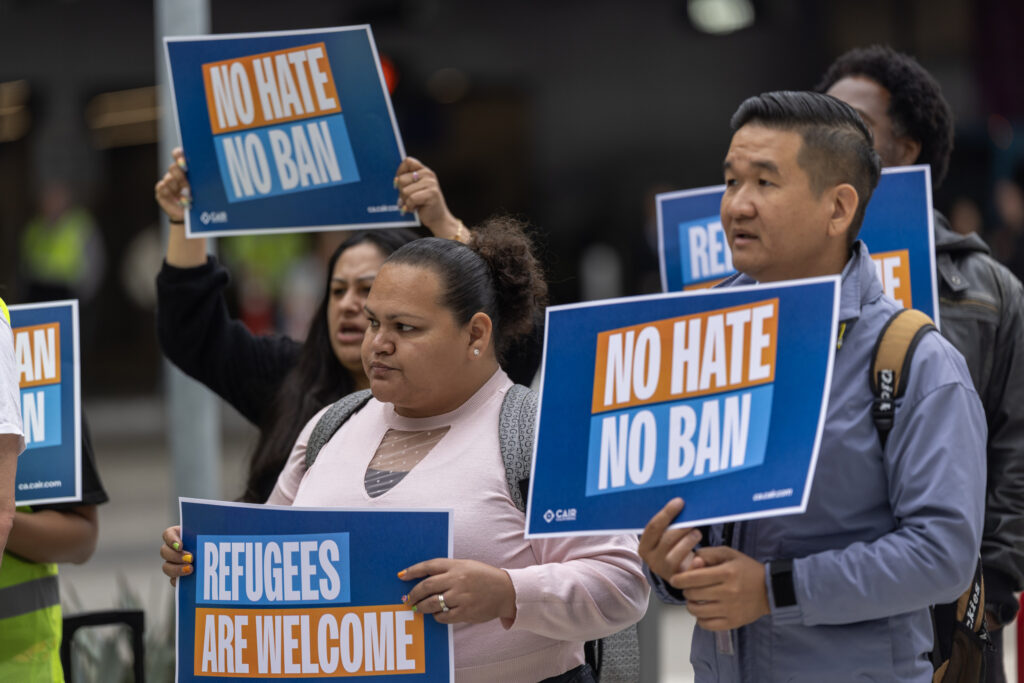A new judge is slated to hear arguments Friday regarding a lawsuit involving foreign nationals and a travel ban that was imposed earlier this year on green card holders, as the number of allotted visas continues to diminish.
Newsweek reached out to the State Department via email for comment.
Why It Matters
President Donald Trump in June announced a travel ban restricting individuals from the following 12 nations: Afghanistan, Myanmar, Chad, Republic of the Congo, Equatorial Guinea, Eritrea, Haiti, Iran, Libya, Somalia, Sudan and Yemen.
He said the move, part of his administration’s broader hardline immigration policies, was done to “protect the nation from foreign terrorist and other national security and public safety threats” citing an attack in Boulder, Colorado by an Egyptian national that targeted a group advocating for the release of Israeli hostages being held by Hamas in the Gaza Strip.
Plaintiffs challenged the travel ban under a nondelegation theory, as well as challenging the State Department’s policy of treating an entry ban as a visa issuance ban—which lawyers for the plaintiffs claim is beyond the scope of the president’s authority.
What To Know
The legal case Thein v. Trump on the Trump administration’s travel ban affecting hundreds of foreign nationals, diversity visa applicants from multiple countries was recently reassigned from Judge Tonya Chutkan to Judge Sparkle Sooknanan, who set a hearing on the motion for preliminary injunction for this Friday at 11 a.m. ET.
Lawyers for the plaintiffs expressed concern in early August that Chutkan, who already is overseeing two other lawsuits and has a past history with Trump due to her previously overseeing the president’s federal election interference case, would be removed from their case.
Curtis Morrison, a lawyer on behalf of the plaintiffs in Thein v. Trump, subsequently filed motions for both expedited discovery and preliminary injunction.
As of Wednesday already 38,260 of the 50,000 allotted visas have been used, Morrison said, including 37,675 by the State Department and 591 by U.S. Citizenship and Immigration Services (USCIS).
He told Newsweek via phone on Thursday that he and his fellow counsel filed a motion to compel the administrative record related to Trump’s travel ban and its implementation, which he said is important “because basically we’ll be able to look behind the curtain and get a better view of the Trump administration’s true rationales behind issuing the ban.”
If successful, it could also lead to more background on the guidance on the ban’s implementation—which should include a cable sent by U.S. Secretary Marco Rubio to all U.S. embassies around June 4-9, according to Morrison.
“And what that means is all the records that show how the government made its decisions,” Morrison told Newsweek via phone on Thursday prior to flying to Washington D.C. for the proceedings. “So, there’s a couple of decisions here: there’s the travel ban itself, and there’s the implementation of the travel ban.
“And the implementation of the travel ban is going to have a cable from Secretary Rubio to all the embassies, ‘Hey, this is how we implement the ban.’ So, it’ll be very interesting to see that cable, to see…how the State Department decided to interpret the ban.”
Morrison added that he was “shocked” the federal government did not object to his motion on Wednesday for administrative record, as he was already waiting for them to file an appeal.
On Tuesday, the government did filed its opposition to Morrison’s motion for preliminary injunction—which included using the word “alien” 94 times in their brief.
He said the government even proposed requesting immigrant plaintiffs to pay a bond if the judge issues a preliminary injunction, which he called “just nuts.”
“If that happens, we’ll probably need to a GoFundMe or something,” he said.
What People Are Saying
President Donald Trump in his June 4 proclamation: “As President, I must act to protect the national security and national interest of the United States and its people. I remain committed to engaging with those countries willing to cooperate to improve information-sharing and identity-management procedures, and to address both terrorism-related and public-safety risks. Nationals of some countries also pose significant risks of overstaying their visas in the United States, which increases burdens on immigration and law enforcement components of the United States, and often exacerbates other risks related to national security and public safety.”
The U.S. Citizenship and Immigration Services wrote on X (formerly Twitter) on May 5: “Green cards and visas will be revoked if an alien breaks the law.”
It said in a later post: “USCIS works alongside our @DHSgov and @StateDept partners each day to keep America, and Americans, safe. From designating foreign terrorist organizations to imposing sanctions, we’re taking action to protect and secure our nation for your families, friends, and future.”
Senator Chris Murphy, a Connecticut Democrat, previously told Newsweek: “The Trump administration’s decision to turn its back on our Afghan allies who risked their lives and the lives of their families to support American troops in Afghanistan is unconscionable.”
What Happens Next
Friday will be important in the future of the green card holders awaiting their fates, Morrison said, with the judge potentially issuing an order that could have broader ramifications for all foreign nationals in the months ahead.
Read the full article here
